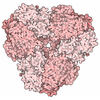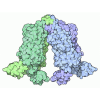[English] 日本語
 Yorodumi
Yorodumi- PDB-8cb6: Crystal structure of human lysosomal acid-alpha-glucosidase, GAA,... -
+ Open data
Open data
- Basic information
Basic information
| Entry | Database: PDB / ID: 8cb6 | ||||||
|---|---|---|---|---|---|---|---|
| Title | Crystal structure of human lysosomal acid-alpha-glucosidase, GAA, in covalent complex with TAMRA tagged 1,6-Epi-cylcophellitol aziridine activity based probe | ||||||
 Components Components | (Lysosomal alpha-glucosidase ...) x 2 | ||||||
 Keywords Keywords | HYDROLASE / Gaa / Pompe disease / activity based probe | ||||||
| Function / homology |  Function and homology information Function and homology information: / autolysosome lumen / maltose metabolic process / alpha-glucosidase activity / sucrose metabolic process / Glycogen storage disease type II (GAA) / alpha-1,4-glucosidase activity / alpha-glucosidase / neuromuscular process controlling posture / glycophagy ...: / autolysosome lumen / maltose metabolic process / alpha-glucosidase activity / sucrose metabolic process / Glycogen storage disease type II (GAA) / alpha-1,4-glucosidase activity / alpha-glucosidase / neuromuscular process controlling posture / glycophagy / tissue development / diaphragm contraction / regulation of the force of heart contraction / glycogen catabolic process / lysosome organization / azurophil granule membrane / aorta development / neuromuscular process controlling balance / muscle cell cellular homeostasis / Glycogen breakdown (glycogenolysis) / tertiary granule membrane / ficolin-1-rich granule membrane / heart morphogenesis / cardiac muscle contraction / lysosomal lumen / locomotory behavior / glucose metabolic process / carbohydrate binding / lysosome / lysosomal membrane / intracellular membrane-bounded organelle / Neutrophil degranulation / extracellular exosome / membrane / plasma membrane Similarity search - Function | ||||||
| Biological species |  Homo sapiens (human) Homo sapiens (human) | ||||||
| Method |  X-RAY DIFFRACTION / X-RAY DIFFRACTION /  SYNCHROTRON / SYNCHROTRON /  FOURIER SYNTHESIS / Resolution: 1.9 Å FOURIER SYNTHESIS / Resolution: 1.9 Å | ||||||
 Authors Authors | Sulzenbacher, G. / Roig-Zamboni, V. / Overkleeft, H. / Artola, M. | ||||||
| Funding support | 1items
| ||||||
 Citation Citation |  Journal: Chem Sci / Year: 2023 Journal: Chem Sci / Year: 2023Title: Fluorescence polarisation activity-based protein profiling for the identification of deoxynojirimycin-type inhibitors selective for lysosomal retaining alpha- and beta-glucosidases. Authors: van der Gracht, D. / Rowland, R.J. / Roig-Zamboni, V. / Ferraz, M.J. / Louwerse, M. / Geurink, P.P. / Aerts, J.M.F.G. / Sulzenbacher, G. / Davies, G.J. / Overkleeft, H.S. / Artola, M. | ||||||
| History |
|
- Structure visualization
Structure visualization
| Structure viewer | Molecule:  Molmil Molmil Jmol/JSmol Jmol/JSmol |
|---|
- Downloads & links
Downloads & links
- Download
Download
| PDBx/mmCIF format |  8cb6.cif.gz 8cb6.cif.gz | 212.1 KB | Display |  PDBx/mmCIF format PDBx/mmCIF format |
|---|---|---|---|---|
| PDB format |  pdb8cb6.ent.gz pdb8cb6.ent.gz | 159.6 KB | Display |  PDB format PDB format |
| PDBx/mmJSON format |  8cb6.json.gz 8cb6.json.gz | Tree view |  PDBx/mmJSON format PDBx/mmJSON format | |
| Others |  Other downloads Other downloads |
-Validation report
| Arichive directory |  https://data.pdbj.org/pub/pdb/validation_reports/cb/8cb6 https://data.pdbj.org/pub/pdb/validation_reports/cb/8cb6 ftp://data.pdbj.org/pub/pdb/validation_reports/cb/8cb6 ftp://data.pdbj.org/pub/pdb/validation_reports/cb/8cb6 | HTTPS FTP |
|---|
-Related structure data
| Related structure data | 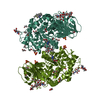 7nwvC  8cb1C 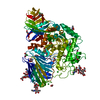 5nn3S S: Starting model for refinement C: citing same article ( |
|---|---|
| Similar structure data | Similarity search - Function & homology  F&H Search F&H Search |
- Links
Links
- Assembly
Assembly
| Deposited unit | 
| ||||||||
|---|---|---|---|---|---|---|---|---|---|
| 1 |
| ||||||||
| Unit cell |
|
- Components
Components
-Lysosomal alpha-glucosidase ... , 2 types, 2 molecules FA
| #1: Protein | Mass: 14095.020 Da / Num. of mol.: 1 Source method: isolated from a genetically manipulated source Details: FULL-LENGTH RHGAA HAS BEEN TREATED WITH CHYMOTRYPSIN, LEADING TO A SAMPLE STARTING AT RESIDUE GLN81. MISSING SURFACE LOOPS HAVE EQUALLY BEEN REMOVED BY PROTEOLYTIC CLEAVAGE. Source: (gene. exp.)  Homo sapiens (human) / Gene: GAA / Production host: Homo sapiens (human) / Gene: GAA / Production host:  |
|---|---|
| #2: Protein | Mass: 82901.570 Da / Num. of mol.: 1 Source method: isolated from a genetically manipulated source Details: FULL-LENGTH RHGAA HAS BEEN TREATED WITH CHYMOTRYPSIN, LEADING TO A SAMPLE STARTING AT RESIDUE GLN81. MISSING SURFACE LOOPS HAVE EQUALLY BEEN REMOVED BY PROTEOLYTIC CLEAVAGE. Source: (gene. exp.)  Homo sapiens (human) / Gene: GAA / Production host: Homo sapiens (human) / Gene: GAA / Production host:  |
-Sugars , 4 types, 5 molecules 
| #3: Polysaccharide | 2-acetamido-2-deoxy-beta-D-glucopyranose-(1-4)-[alpha-L-fucopyranose-(1-6)]2-acetamido-2-deoxy-beta- ...2-acetamido-2-deoxy-beta-D-glucopyranose-(1-4)-[alpha-L-fucopyranose-(1-6)]2-acetamido-2-deoxy-beta-D-glucopyranose Source method: isolated from a genetically manipulated source | ||||
|---|---|---|---|---|---|
| #4: Polysaccharide | Source method: isolated from a genetically manipulated source #5: Polysaccharide | beta-D-mannopyranose-(1-4)-2-acetamido-2-deoxy-beta-D-glucopyranose-(1-4)-2-acetamido-2-deoxy-beta- ...beta-D-mannopyranose-(1-4)-2-acetamido-2-deoxy-beta-D-glucopyranose-(1-4)-2-acetamido-2-deoxy-beta-D-glucopyranose | Source method: isolated from a genetically manipulated source #10: Sugar | ChemComp-NAG / | |
-Non-polymers , 7 types, 642 molecules 
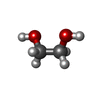
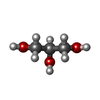

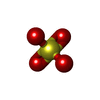
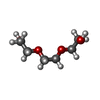







| #6: Chemical | ChemComp-CL / #7: Chemical | ChemComp-EDO / #8: Chemical | ChemComp-GOL / #9: Chemical | ChemComp-U54 / ( | #11: Chemical | ChemComp-SO4 / #12: Chemical | ChemComp-PGE / | #13: Water | ChemComp-HOH / | |
|---|
-Details
| Has ligand of interest | Y |
|---|---|
| Has protein modification | Y |
-Experimental details
-Experiment
| Experiment | Method:  X-RAY DIFFRACTION / Number of used crystals: 1 X-RAY DIFFRACTION / Number of used crystals: 1 |
|---|
- Sample preparation
Sample preparation
| Crystal | Density Matthews: 3.35 Å3/Da / Density % sol: 63 % |
|---|---|
| Crystal grow | Temperature: 293 K / Method: vapor diffusion, hanging drop / pH: 7 Details: 1.9 M AMMONIUM SULPHATE, 0.1 M HEPES, 2% V/V PEG400 |
-Data collection
| Diffraction | Mean temperature: 100 K / Serial crystal experiment: N |
|---|---|
| Diffraction source | Source:  SYNCHROTRON / Site: SYNCHROTRON / Site:  SOLEIL SOLEIL  / Beamline: PROXIMA 2 / Wavelength: 0.980112 Å / Beamline: PROXIMA 2 / Wavelength: 0.980112 Å |
| Detector | Type: DECTRIS EIGER X 9M / Detector: PIXEL / Date: Sep 15, 2021 |
| Radiation | Protocol: SINGLE WAVELENGTH / Monochromatic (M) / Laue (L): M / Scattering type: x-ray |
| Radiation wavelength | Wavelength: 0.980112 Å / Relative weight: 1 |
| Reflection | Resolution: 1.9→48.67 Å / Num. obs: 103337 / % possible obs: 100 % / Redundancy: 13.7 % / CC1/2: 0.999 / Rmerge(I) obs: 0.13 / Rpim(I) all: 0.036 / Rrim(I) all: 0.135 / Χ2: 0.99 / Net I/σ(I): 14.5 / Num. measured all: 1418173 |
| Reflection shell | Resolution: 1.9→1.93 Å / % possible obs: 100 % / Redundancy: 13.9 % / Rmerge(I) obs: 1.675 / Num. measured all: 70368 / Num. unique obs: 5053 / CC1/2: 0.695 / Rpim(I) all: 0.465 / Rrim(I) all: 1.739 / Χ2: 1.08 / Net I/σ(I) obs: 1.9 |
- Processing
Processing
| Software |
| ||||||||||||||||||||||||||||||||||||||||||||||||||||||||||||||||||||||||||||||||||||||||||||||||||||||||||||||||||||||||||||||||||||||||||||||||||||||||||||||||||||||||||||||||||||||
|---|---|---|---|---|---|---|---|---|---|---|---|---|---|---|---|---|---|---|---|---|---|---|---|---|---|---|---|---|---|---|---|---|---|---|---|---|---|---|---|---|---|---|---|---|---|---|---|---|---|---|---|---|---|---|---|---|---|---|---|---|---|---|---|---|---|---|---|---|---|---|---|---|---|---|---|---|---|---|---|---|---|---|---|---|---|---|---|---|---|---|---|---|---|---|---|---|---|---|---|---|---|---|---|---|---|---|---|---|---|---|---|---|---|---|---|---|---|---|---|---|---|---|---|---|---|---|---|---|---|---|---|---|---|---|---|---|---|---|---|---|---|---|---|---|---|---|---|---|---|---|---|---|---|---|---|---|---|---|---|---|---|---|---|---|---|---|---|---|---|---|---|---|---|---|---|---|---|---|---|---|---|---|---|
| Refinement | Method to determine structure:  FOURIER SYNTHESIS FOURIER SYNTHESISStarting model: 5NN3 Resolution: 1.9→48.67 Å / Cor.coef. Fo:Fc: 0.973 / Cor.coef. Fo:Fc free: 0.963 / SU B: 2.413 / SU ML: 0.069 / Cross valid method: FREE R-VALUE / ESU R: 0.097 / ESU R Free: 0.096 / Stereochemistry target values: MAXIMUM LIKELIHOOD / Details: HYDROGENS HAVE BEEN ADDED IN THE RIDING POSITIONS
| ||||||||||||||||||||||||||||||||||||||||||||||||||||||||||||||||||||||||||||||||||||||||||||||||||||||||||||||||||||||||||||||||||||||||||||||||||||||||||||||||||||||||||||||||||||||
| Solvent computation | Ion probe radii: 0.8 Å / Shrinkage radii: 0.8 Å / VDW probe radii: 1.2 Å / Solvent model: BABINET MODEL WITH MASK | ||||||||||||||||||||||||||||||||||||||||||||||||||||||||||||||||||||||||||||||||||||||||||||||||||||||||||||||||||||||||||||||||||||||||||||||||||||||||||||||||||||||||||||||||||||||
| Displacement parameters | Biso mean: 41.148 Å2
| ||||||||||||||||||||||||||||||||||||||||||||||||||||||||||||||||||||||||||||||||||||||||||||||||||||||||||||||||||||||||||||||||||||||||||||||||||||||||||||||||||||||||||||||||||||||
| Refinement step | Cycle: 1 / Resolution: 1.9→48.67 Å
| ||||||||||||||||||||||||||||||||||||||||||||||||||||||||||||||||||||||||||||||||||||||||||||||||||||||||||||||||||||||||||||||||||||||||||||||||||||||||||||||||||||||||||||||||||||||
| Refine LS restraints |
|
 Movie
Movie Controller
Controller


 PDBj
PDBj



